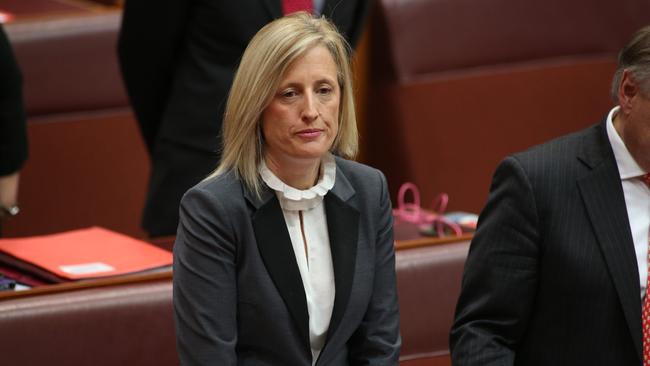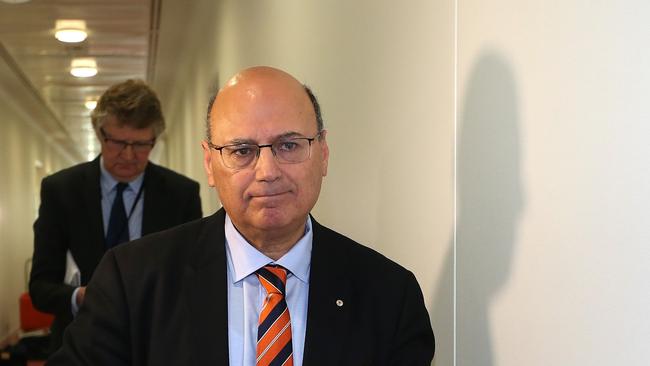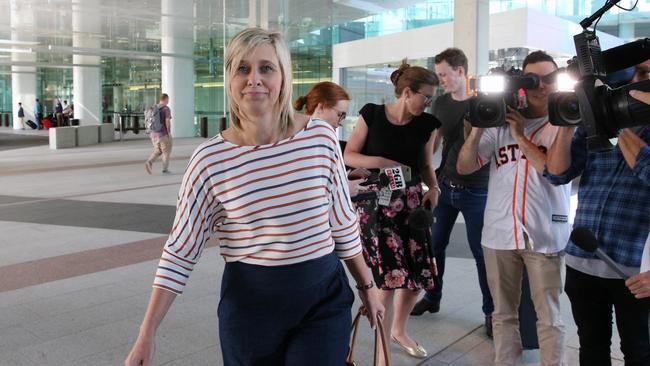Senators’ citizenship: Katy Gallagher was British citizen at nomination
Katy Gallagher was a British citizen when she nominated for last year’s election, clearing the way for a High Court referral.

ACT Labor senator Katy Gallagher was a British citizen when she nominated for last year’s election, clearing the way for a referral to the High Court of Australia.
Senators’ citizenship disclosure statements were published at midday today; lower house MPs have until 9am tomorrow to hand in their paperwork.
POLITICS NOW: Follow today’s live blog from Canberra
Documents released through the citizenship register today show renunciation of Senator Gallagher’s British citizenship, which she gained through her father, did not take effect until August 16, 2016.
Her citizenship disclosure also confirms she was a British citizen in the previous parliament when she was chosen to fill a casual vacancy in March 2015.
In a statement today Senator Gallagher said: “I have acted, at all times, with the legal advice provided to me.
“Based on all the advice I have available to me I do not believe that I should refer myself to the Court of Disputed Returns however ultimately that will be a matter for the Senate to determine.”
Senator Gallagher began steps to renounce any British citizenship on April 20 of last year, with the UK Home Office accepting payment in order to process the request on May 6.
But the UK government wrote to Senator Gallagher on July 1, a day before the election, requesting original documents (her birth certificate and her parents’ marriage certificate) in order to properly process the request.
Advice from immigration lawyer Adrian Berry, who is an expert in British nationality law, says “this request for specific forms of evidence was unnecessary” and she had already supplied what was required when she sought renunciation in April, when she enclosed a copy of her birth certificate.
Nonetheless, Senator Gallagher enclosed original versions of the required documents, and included her father’s birth certificate, on July 20. A stamp of registration of her renunciation shows she ceased being British on August 16.
This puts her in the same camp as Labor’s lower house member Justine Keay and Nick Xenophon Team member Rebekha Sharkie, who took steps to renounce their British citizenship before nominating but did not have their renunciation take effect until after nominations closed.
Mr Berry said in his opinion that “Senator Gallagher is not a British citizen”.
“As I took all necessary steps to renounce British citizenship in accordance with the requirements of British law, prior to nomination, I had therefore absolved myself of any impediment under section 44(i) of the Australian Constitution,” Senator Gallagher says in her disclosure statement.
The government has singled out Ms Keay, Ms Sharkie and Labor’s Susan Lamb - who revealed last month her application to renounce British citizenship was refused by the UK Home Office because it could not determine her status from the documents provided – for referral.

Sinodinos clarifies paperwork
Liberal frontbencher Arthur Sinodinos has sought to clarify his citizenship status with further documentation after he referred to formal legal advice from the Greek government on his citizenship form but did not provide the advice.
He has now tweeted a copy of a letter from the Greek government confirming he is not a citizen.
“The Senate motion requires documentary evidence only of those who have held citizenship of a foreign country. For completeness, I attach a letter from the Greek Government so as to confirm my status,” Senator Sinodinos tweeted.
Senator Sinodinos, who is currently on leave while he battles cancer, was born in Australia to parents who were both born in Cephalonia, Greece.
The Senate motion requires documentary evidence only of those who have held citizenship of a foreign country. For completeness, I attach a letter from the Greek Government so as to confirm my status. pic.twitter.com/vlDYZTXibo
— Arthur Sinodinos AO (@A_Sinodinos) December 4, 2017
“I engaged ABL (Arnold Bloch Liebler lawyers) to seek advice on Greek law and to conduct searches with relevant authorities in Greece,” Senator Sinodinos says on his form.
“As a result of those searches, ABL received formal advice from the Greek government confirming I am not a Greek citizen nor have I ever been one, and nor am I, nor have I ever been, entitled to the rights or privileges of a Greek citizen.”
Unlike other senators citing documentation, Senator Sinodinos had - until his tweet - not provided a copy of a letter from his lawyers, or the advice he says they received from the Greek government.
Senator Sinodinos also notes that his wife’s father was born in Dublin, Ireland.
“I have never registered or made any declaration or taken any steps to take up Irish citizenship,” he says on his form. “My marriage in February 2000 did not confer Irish citizenship on me.”

Senators lagged in previous parliaments
Liberal senator Dean Smith, Labor’s Lisa Singh and Louise Pratt and Green Nick McKim all appear to have been dual citizens when they nominated for election in previous parliaments, according to their citizenship documents.
However, this has no bearing on their current eligibility.
Senator Smith filled a casual vacancy in the Senate on May 2, 2012, following the death of WA Liberal Judith Adams.
He had inherited British citizenship through his British-born father, and did not renounce this until July 30, 2012.
Senator Singh was born in Hobart in 1972 to an Australian mother and a Fijian father, who was a British citizen at the time of her birth as Fiji was a former British colony.
Her renunciation of her British citizenship did not take effect until August 18, 2010, several weeks after nominations closed on July 29 but three days before the August 21 election.
This means she was technically ineligible to be elected to stand in the 43rd parliament, but has no effect on her legitimacy to stand in the two subsequent federal elections.
The Fijian constitution of 1990 introduced a prohibition on dual citizenship, and stripped all dual citizens of their Fijian citizenship.
The prohibition has since been revoked, but citizenship has not been conferred on those who lost it and did nothing to reclaim it, so Senator Singh has not held Fijian citizenship since nominating for parliament.
Senator Pratt received British citizenship through her father.
Her renunciation did not take effect until November 23, 2007, several weeks after the November 1 nomination date for the November 24 election.
Senator McKim was born in Britain, and was appointed to the federal Senate by the Tasmanian parliament on August 19, 2015, after Greens leader Christine Milne resigned.
His nomination was approved by the Greens in July 2015.
He had previously been a member of the Tasmanian Upper House, where dual citizenship is not prohibited, since 2002.
The British Home Office says it received Senator McKim’s request to renounce his British citizenship on August 14, 2015, however, he has not included documentation confirming the date it was renounced.
What next?
Leader of the House Christopher Pyne said the government would refer any MP to the High Court if they had a cloud over their eligibility, including ones from Labor or the crossbench.
“Labor is still harbouring members who clearly have issues around their citizenship, Susan Lamb has admitted that the UK wrote back to her indicating she hadn’t provided the information required for her to renounce her citizenship, so she was a UK citizen when she was nominated and the same thing with Justine Keay,” Mr Pyne told ABC radio this morning.
“Therefore both have serious clouds over their citizenship and Bill Shorten has harboured and protected them rather than doing the right thing which was to get then to resign and have by-elections.”
Mr Pyne said the government was confident there were no other Coalition MPs with issues as it has “done our own investigations”.
Ms Lamb says she won’t support any moves to refer her to the High Court over her citizenship cloud.
“We already wasted $122 million on a postal survey, why waste any more money? I’m confident there is no need to,” Ms Lamb told ABC radio.
Labor is arguing she took “reasonable steps” to rescind her citizenship which was the precedent set in the Sykes v Cleary High Court judgment in 1992.
Mr Pyne said the government, Labor and crossbenchers had agreed to establish a register of citizenship disclosure statements with a deadline of tomorrow morning after making a “fair assumption” most people had checked their status and steps they took to renounce any foreign nationality.
It is likely the documents will then be made public late on Wednesday or first thing Thursday morning.
“We want to give the Speaker and the clerks ample time to be able to get the information up onto the internet to enable people who are interested to examine the evidence as presented by members and then to give us ample time in the House of Representatives this week to refer any members to the High Court if that is in fact necessary,” Mr Pyne told the chamber.
“In the case of at least three members, the government believes it will be necessary and that is not a debate we have to make today.”
It is likely the documents will then be made public late on Wednesday or first thing Thursday morning.

What MPs must disclose
Like senators, members will have to disclose the following in relation to their citizenship status:
Members’ statements in relation to citizenship
(1) By not later than 9am, 5 December 2017 (and otherwise within 21 days of making and subscribing an oath or affirmation as a Member of the House of Representatives) each Member shall provide to the Registrar of Members’ Interests a statement containing the following:
(a) a declaration by the Member that, at the time the Member nominated for election to the House of Representatives in this 45th Parliament, he or she was an Australian citizen;
(b) a declaration that the Member is not a citizen of any country other than Australia;
(c) a declaration stating:
(i) the place and date of the Member’s birth;
(ii) the citizenship that the Member held at the time of birth; and
(iii) if he or she did not obtain Australian citizenship at birth, the date he or she was naturalised as an Australian citizen;
(d) so far as the Member is aware the place and date of birth of the Member’s parents, grandparents and spouse (if applicable);
(e) whether the Member has ever been a citizen of another country and, if so, which country or countries;
(f) what steps the Member has taken to assure him or herself that the Member has not acquired citizenship of another country by descent, marriage or other means;
(g) if the Member has answered the question in (e) in the affirmative, details and evidence of the date and manner in which the Member’s citizenship of that other country was renounced (if it was renounced) and/or the date and manner in which it came to an end in accordance with the laws of that other country;
(h) if the Member’s citizenship of that other country had not come to an end at the date of his or her nomination for the House of Representatives, details and evidence of any steps the Member has taken to renounce the citizenship of that other country prior to the date of nomination; and
(i) if the Member has declared that he or she was at the time of nomination or is now a citizen of a country other than Australia, on what basis the Member contends that he or she is, nonetheless, not disqualified under section 44(i) of the Constitution.



